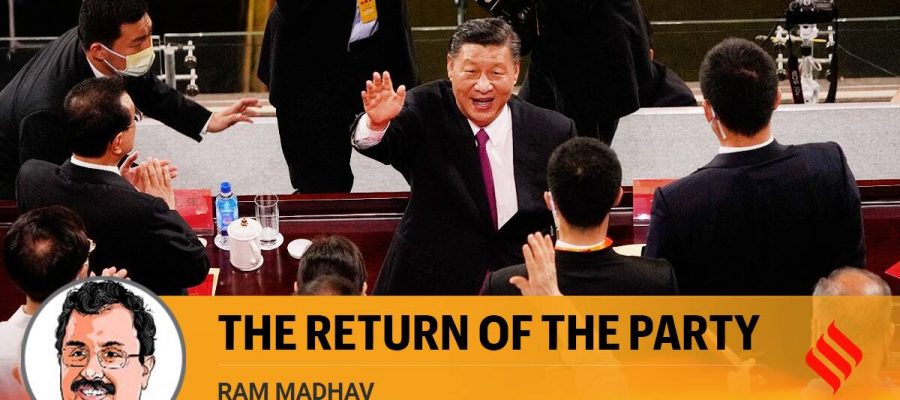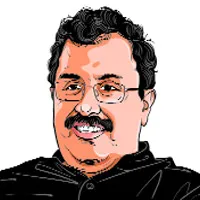Ram Madhav writes: Xi got the CCP Charter amended in 2017 to restore the party’s supremacy, saying, 'Government, the military, society and schools, north, south, east and west – the Party leads them all.’
Get email alerts for your favourite author. Sign up here
On July 1, the Communist Party of China (CPC), celebrated its centenary. The last time that such an event occurred was in 1981 when the party had completed 60 years. Deng Xiaoping was the paramount leader at that time, and he used the occasion to push through a major reform agenda. Four decades later, the party is celebrating this most-awaited event with a completely different agenda.
With its power and influence, the CPC would have liked the centenary to be a global event, marking the arrival of what President Xi Jinping described in 2018 as the “new political-party system” — one-party rule with expansive public consultation mechanisms. But the Covid-19 pandemic spilt water over these ambitions. The celebrations will be confined largely to China and its people.
July 1 was unilaterally decided as the Foundation Day by Mao Tse Tung in 1941, although the official records show that the party was born on July 23, 1921, at Mao’s house in Shanghai’s French Quarter. Two representatives from the Comintern — Communist International — were also present along with a handful of Mao’s colleagues. The meeting had to be hurriedly abandoned when an unknown person entered the room, forcing the leaders to disperse. The next two decades saw the party rising through relentless struggle to finally build a formidable People’s Liberation Army of over one million soldiers by the end of the Second World War and capture power in 1949.
The CPC began its journey as a party with collective leadership. In the initial years, it was aligned with Chiang Kai-shek’s ruling Kuomintang. But a major fallout with Kuomintang in 1926 had resulted in brutal purges by Chiang Kai-shek’s National Revolutionary Army in 1927 and 1933. Considerably weakened, the party had decided to give up its character of collective leadership and declared Mao as the “core leader” in 1935, vesting both the party and army leadership in him.
That was the time when cruel authoritarians were rising to power in other parts of the world too. After becoming the Chancellor in 1933, Hitler quickly turned Germany into an authoritarian state. In neighbouring Italy, Benito Mussolini, who captured power in 1922 without fighting the election, gradually consolidated his grip by 1929 by converting the country into a single-party state. In Soviet Russia, Stalin had emerged as the all-powerful cruel dictator with firm control over the Soviet Communist Party apparatus. Mao had never read Marx, but he was willing to be guided by Stalin’s cronies initially. The CPC that he had moulded in the initial decades was Stalinist in organisational structure and nationalist in character.
From 1949 until his demise in 1976, Mao remained the supreme leader of the CPC. He modelled China as a one-party state with all powers concentrated in the hands of the “core leader”. His was the last word in the party. Incidentally, the concept of “core leader” has returned to the CPC when the party passed a resolution in 2018 anointing Xi Jinping as one.
In its 100-year history, the CPC has seen three leaders with towering profiles: Deng after Mao, who remained at the helm in the 1980s and ’90s and now Xi.
Deng’s era was the golden period in Communist China’s history. The reformist agenda he introduced in 1981 led to China’s opening up to the rest of the world and is at the root of the economic, scientific and technological progress that the country enjoys today. Every Chinese citizen owes his $11,000 (per capita GDP) to Deng. As soon as he became the paramount leader in the late 1970s, Deng embarked on courting arch-enemies like Japan and hated capitalists like America for support. “The colour of the cat hardly matters as long as it is catching the mice”, argued this pragmatic nationalist.
But Deng was a loyal Communist too. Although Mao’s Soviet-style collectivisation programmes in the 1950s and the dreaded Cultural Revolution in 1966-76 had devastated the country, Deng refused to do a Khrushchev in China. After Stalin died in 1953, his successor, Khrushchev, chose the 20th Party Congress in 1956 to denounce and denigrate Stalin, thus effectively ending the Stalinist legacy.
But thanks to Deng’s liberal attitude, Mao’s legacy remained intact. Xi is aggressively pushing for its revival. Deng had attempted the separation of state and party by appointing different leaders to head the two. Hu Yaobang was asked to handle party affairs while Zhao Ziyang was made the head of the government. But under Xi, the party has made a grand comeback. In the last decade, the CPC has re-emerged as the sinews of the entire Chinese nation. The ubiquitous Party Committees that had lost relevance during Deng’s era have come back in full force in every office and village. The 92-million-member CPC’s membership is at a premium today with thousands applying for it and very few securing it after thorough scrutiny. Xi got the CCP Charter amended in 2017 to restore the party’s supremacy, saying, “Government, the military, society and schools, north, south, east and west — the Party leads them all.”
The CPC is proud of its hundred-year existence — almost no others have existed for that long elsewhere in the world. It also claims that the “Xiaokang society” — “moderately well-off society” — that it had set as the target for the centenary has been achieved with accelerated progress in all areas including military, space, cyber, economy and even climate protection. That gives it a smug belief that the rest of the world should emulate it.
But, despite absolute power in his hands, Mao was insecure all through and indulged in repeated purges of the senior leadership, including Deng. Xi too betrays insecurity through his repeated purges of senior leaders like Bo Xilai and incessant references to Khrushchev’s “treachery”. It is this insecurity that reflects in the centenary-year propaganda’s vilification of Deng’s remarkable era of progress in the 1980s as “another darkest hour arrived due to the impact of Western liberalist thought”.
This column first appeared in the print edition on July 2, 2021 under the title ‘The return of the Party’. The writer is member, board of governors, India Foundation.
Source: Read Full Article




